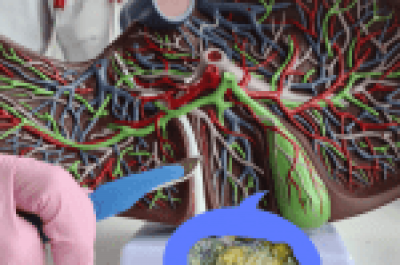Liver Cleanse to Avoid Gallstone Pancreatitis

Article Summary
Liver cleanses can play an important role in keeping your liver healthy and preventing a serious condition called gallstone pancreatitis. Gallstone pancreatitis happens when hard, stone-like deposits called gallstones block the bile ducts. This blockage can make pancreatic enzymes, which help digest food, flow backward into the pancreas, causing irritation and inflammation. This is very painful and can lead to more health problems. Regular liver cleanses can help keep bile moving smoothly through the liver and gallbladder, reducing the risk of gallstones.
The pancreas and liver work together to help your body digest food. The pancreas releases enzymes that break down food in the small intestine, while the liver produces bile to help digest fats. The gallbladder stores this bile until it’s needed. If gallstones form and block the ducts, bile can’t flow properly, leading to health problems. By focusing on liver health, we can help prevent gallstone formation and avoid pancreatitis.
Preventing gallstone pancreatitis involves eating a balanced diet, staying active, and maintaining a healthy weight. Drinking enough water and eating foods that support liver health can make a big difference. Avoiding alcohol and limiting foods high in cholesterol and fat can also help. Taking steps to keep the liver healthy can reduce the chances of gallstones and help keep the digestive system working well.
Want to know more details?
Check out the full article below.
Why Liver Cleanses Are Important for
Preventing Gallstone Pancreatitis
Your liver, gallbladder, and pancreas all work together to support digestion and detoxification. But when the liver isn’t functioning properly, bile flow slows down, increasing the risk of gallstones and gallstone pancreatitis—a painful and potentially life-threatening condition.
At Intentional Wellness, Inc., I take a functional medicine approach to liver health, focusing on supporting natural detoxification and improving bile flow to prevent complications like gallstone pancreatitis.
What is Gallstone Pancreatitis?
Gallstone pancreatitis (biliary pancreatitis) happens when gallstones block the bile ducts, causing digestive enzymes from the pancreas to back up into the pancreas itself. This leads to severe inflammation, irritation, and even permanent tissue damage.
Symptoms of gallstone pancreatitis include:
- Severe abdominal pain (upper right or middle)
- Nausea and vomiting
- Fever and chills
- Jaundice (yellowing of skin and eyes)
Understanding how the liver, gallbladder, and pancreas work together can help you see why regular liver cleansing is key to preventing this dangerous condition.
How the Liver, Gallbladder, and Pancreas Work Together
Your liver produces bile, which helps break down fats and remove toxins. This bile is stored in the gallbladder and released when you eat fatty foods. The pancreas also releases digestive enzymes to help with fat and nutrient absorption.
When the liver is sluggish, bile becomes thick and concentrated, leading to gallstone formation. If a gallstone blocks the bile ducts, bile and digestive enzymes back up into the pancreas, triggering inflammation.
This is why keeping the liver healthy and promoting bile flow naturally can help prevent gallstones—and ultimately, gallstone pancreatitis.
What Causes Gallstones?
Gallstones form when bile becomes imbalanced, often due to too much cholesterol, bilirubin, or calcium salts. Several factors increase the risk of gallstone formation, including:
Poor Diet and Nutrient Deficiencies
- Too much processed food, sugar, and unhealthy fats can slow bile production.
- Low intake of fiber and bitter foods reduces bile flow, increasing the risk of gallstones.
Insulin Resistance and Metabolic Syndrome
- Blood sugar imbalances contribute to gallstone formation.
- Women with PCOS or type 2 diabetes have a higher risk of developing gallstones.
Estrogen Dominance and Hormonal Changes
- Pregnancy, birth control pills, and hormone therapy can increase gallstone risk.
- The liver helps remove excess estrogen, but if it’s not functioning well, hormone imbalances worsen.
Liver Congestion and Toxin Overload
- Alcohol, medications, and environmental toxins can slow bile flow.
- If the liver can’t effectively detox, bile becomes thick and stagnant, forming gallstones.
When gallstones grow larger or block the bile ducts, they can lead to pain, digestive issues, and pancreatitis—making prevention crucial.
Gallstone Pancreatitis:
When Gallstones Cause a Bigger Problem
If a gallstone blocks the pancreatic duct, digestive enzymes become trapped in the pancreas instead of reaching the small intestine. These enzymes begin digesting the pancreas itself, causing:
- Severe inflammation and pain
- Nausea, vomiting, and bloating
- Fever and jaundice (yellowing of skin and eyes)
- Potential complications like infection, cysts, or organ failure
This is why early prevention through supporting liver function and bile flow is essential—rather than waiting until gallstones cause serious complications.
How to Prevent Gallstone Pancreatitis Naturally
The best way to avoid gallstone-related issues is to keep the liver clean and bile flowing properly. Functional medicine focuses on diet, lifestyle changes, and liver support to reduce the risk of gallstones and pancreatitis.
Support the Liver with a Gallbladder-Friendly Diet
- Eat fiber-rich foods (leafy greens, flaxseeds, chia seeds) to improve digestion.
- Include healthy fats (avocados, olive oil, coconut oil) to stimulate bile flow.
- Avoid processed foods, sugar, and trans fats, which slow bile production.
Promote Bile Flow with Bitter Foods & Nutrients
- Bitter foods like dandelion greens, radishes, and artichokes help stimulate bile.
- Choline (found in eggs and liver) helps keep bile thin and flowing.
- Apple cider vinegar supports digestion and bile release before meals.
Reduce Inflammation & Toxin Load
- Drink plenty of water and herbal teas to support detoxification.
- Avoid alcohol, processed meats, and excessive caffeine, which stress the liver.
- Take anti-inflammatory herbs like turmeric and ginger to protect the liver and pancreas.
Stay Active & Manage Blood Sugar
- Regular exercise improves insulin sensitivity and prevents gallstone formation.
- Keeping blood sugar balanced helps prevent cholesterol buildup in bile.
How Liver Cleanses Help Prevent
Gallstones and Pancreatitis
Liver cleanses aren’t about extreme detoxes or fasting—they’re about giving your liver what it needs to work optimally. A functional medicine approach to liver cleansing includes:
- Eating antioxidant-rich foods (beets, berries, dark leafy greens)
- Supporting bile flow with bitter foods and key nutrients
- Staying hydrated and reducing toxin exposure
- Using gentle liver-supporting supplements
When the liver functions properly, bile flows smoothly, gallstones are less likely to form, and the risk of gallstone pancreatitis is reduced.
Liver Detox Supplements for Gallbladder Health
Certain liver-supporting supplements can help keep bile flowing and protect the liver from damage.
Milk Thistle (Silymarin)
- Protects liver cells from toxins and oxidative stress.
- Stimulates bile production for better fat digestion.
N-Acetylcysteine (NAC) & Glutathione
- Boost the liver’s detoxification pathways.
- Help break down toxins and remove harmful substances.
Dandelion Root & Artichoke Extract
- Promote bile flow and gallbladder function.
- Help flush out stagnant bile and prevent gallstone formation.
Ox Bile Supplements (For Those Without a Gallbladder)
- Help replace bile for proper fat digestion after gallbladder removal.
- Reduce bloating, discomfort, and nutrient deficiencies.
Take Control of Your
Liver & Gallbladder Health
Gallstone pancreatitis is a serious condition, but it can be prevented by keeping the liver and gallbladder healthy. By supporting bile flow, reducing toxins, and following a liver-friendly diet, you can lower your risk of gallstones and protect your pancreas.
At Intentional Wellness, Inc., I help clients:
- Identify early signs of gallbladder dysfunction.
- Create personalized liver-supporting nutrition plans.
- Improve bile flow naturally to prevent gallstones and pancreatitis.
Struggling with digestive issues or gallbladder discomfort?
Let’s address the root cause.
Schedule a consultation today!
References
- Ciesla, Matthew A., and Manda, Katherine D. “The Role of Nutrition in Liver Health: Dietary Recommendations for the Prevention of Gallstone Disease.” Journal of Gastroenterology and Hepatology, https://www.ncbi.nlm.nih.gov/pmc/articles/PMC5720237/.
- Toti, Leandro, et al. “Preventive Measures for Gallstone Pancreatitis: Nutrition and Lifestyle Interventions.” National Institute of Health, https://www.ncbi.nlm.nih.gov/pmc/articles/PMC4567893/.
- Everhart, James E., and Khare, Madhulika. “The Epidemiology of Gallstone Disease and Its Relationship with the Liver.” Nature Reviews Gastroenterology & Hepatology, https://www.nature.com/articles/nrgastro.2008.132




